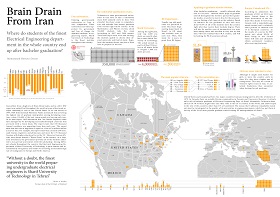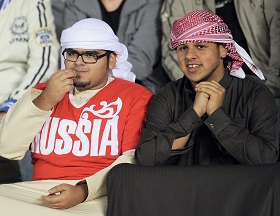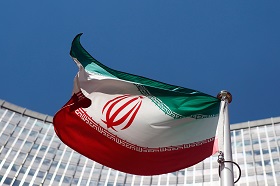Russia — Iran Scientific and Technical Cooperation: Is There Any?
A view of the Iranian Space Agency (ISA) in
Mahdash
Iran has been quite specific in outlining its
science and technology interests in Russia,
which include aerospace and civil aviation
(no votes) |
(0 votes) |
PhD in History, expert at the Institute of Strategic Estimates and Analysis, Assistant Professor at the Higher School of Economics
The validity of Iran's scientific and technological breakthroughs is difficult to access due to the lack of information that could provide an unbiased glimpse into the real state of affairs. From time to time, Tehran has publicized its scientific successes, as in 2006 and 2011 when it claimed to have acquired the technology for controlled fusion, which later would not be backed up by evidence.
Must Know
Assessing the real status of Iranian science is an extremely challenging job, because the country’s achievements are a significant part of the country's state ideology. Scientific feats are seen by Tehran as a response to the West, which has sanctioned its fuel and energy complex, the nation's key industry, as well as the vehicle to convince the population that despite pressure from the United States and the West, the Islamic Republic of Iran is boldly moving ahead with due attention to the wellbeing of the people and the country’s military power.
In this context, the validity of Iran's scientific and technological breakthroughs is difficult to access due to the lack of information that could provide an unbiased glimpse into the real state of affairs. From time to time, Tehran has publicized its scientific successes, as in 2006 and 2011 when it claimed to have acquired the technology for controlled fusion [1], which later would not be backed up by evidence. However, Iran is definitely advancing national education for the development of national science along both its fundamental and applied tracks. The support comes both from the government and the top clergy that provides special Sharia-based clarifications and issues fatwas to bless scientific research, as was the case with Ayatollah Khomeini, the founder of the Islamic Republic, and Ali Khamenei, the current Rahbar [2].
In fact, Iran plunged into scientific development only in the early 2000s, after recuperating from the exhausting war with Iraq. During the past 10 years, the citation index of Iranian scientists has grown immensely – according to official data, from 2,000 articles in 2001 to 27,500 in 2010 [3] - while Iran also reported such maiden breakthroughs as the creation of its own electronic microscope [4] lauded by national media. The SCImago rating places the University of Tehran, University Tarbiat Modares and Sharif University of Technology in the global top thousand [5]. In 2103, Iran emerged as the Muslim world leader in nano products (43 percent of total output, with prices much lower than those of Western analogues, making them highly competitive) [6], and also was quite successful in space research and producing advanced military equipment [7].
In fact, Iran plunged into scientific development only in the early 2000s, after recuperating from the exhausting war with Iraq.
Iranian sources insist that the country has received over 100 patents in Europe and the U.S.A., and has 500 research centers, 140 state-owned and 540 non-state higher education establishments, and 250 science-intensive industrial projects [8].
However, Iranian reports are regularly questioned by the Western media, which is most apparent with regards to the information war over the Iranian space program. Tehran insists on its incredible achievements in this area, i.e. the construction of satellites, manned spaceship programs [1] (technologies possessed only by the United States, Russia and China), as well as several successful experiments with launching spacecraft with a live monkey aboard [10].
Science Management: the Perennial Clash of Reformers and Conservatives
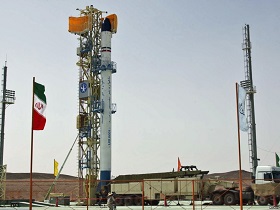
The science strategy is developed by the Ministry of Science, Research and Technology, currently led by Ali Najafi.
In early 2000, Tehran established government bodies in charge of priority research, i.e. the Iranian Space Agency [11], the Special Office for Nanotechnologies under the patronage of president's administration [12] , and the National Science Foundation for supporting outstanding researchers and specialists [13].
The science strategy is developed by the Ministry of Science, Research and Technology, currently led by Ali Najafi.
Mr. Najafi, a professional mathematician and former rector of Isfahan University, is a well-known figure most active in the reformist camp, which also includes President Hassan Rouhani. He has also been quite successful in politics – twice minister of education, i.e. in 1981-1984 in the cabinet of Mir-Hussein Musawi and in 1989-1997 under President Hashemi Rafsanjani. Moreover, in 1997, he was vice president and head of the Committee on Budget Planning and head of the Organization for Cultural Heritage, Tourism and Handicrafts of the Islamic Republic under President Mohammad Khatami [14]. After resigning, Najafi continued to support the reformists as a personal advisor of Mehdi Kyarubi, an opposition presidential candidate [15] (Kyarubi and Musawi are associated with domestic unrest in 2009 after the presidential victory of Mahmud Ahmadinejad, when many Iranians demonstrated in major cities in the belief that the poll was rigged; both are currently under house arrest).
The situation around the Ministry of Education very well depicts how important innovation is for Iran’s national economy. Conservatives have always struggled to reach its top post, regarding the ministry as a key lever. Hassan Rouhani quite recently ran for the post not so long ago, although the Majlis failed to approve his appointment [16]. Since the reformists now have the upper hand on the domestic scene, the ministry is under progressive control, with the conservatives tirelessly resisting. Reza Faraji-Dana, Mr. Najafi's predecessor and another protégé of Mr. Rouhani, was fired by parliament following accusations of instigating the students' unrest in 2009 [17].
Current Affairs
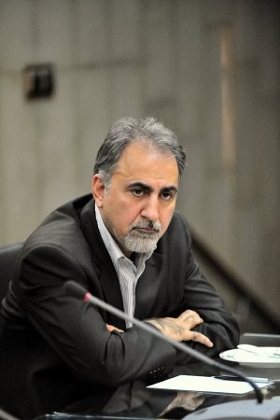
Ali Najafi
Tehran believes that Moscow has been insufficiently helpful in countering the international embargo and that bilateral business contacts are advancing too slowly because Russia will not challenge the global community.
Except for nuclear energy and defense sector, the science and technology relationship between Russia and Iran is rather static for several reasons.
First, Iranian scientific thought is quite young and had not been of interest for the partnership for quite some time.
Second, Russia was hit by international sanctions through intensified contacts with Iran in such politically sensitive areas as science and technology (among other things, due to the U.S. sanctions, Russia was not able to sell the TU-204SM aircraft to Iran [18] ).
Third, Tehran prefers to achieve technology breakthroughs exclusively on its own in the belief that technology progress and sovereignty are directly linked.
Notably, Iran has always been reserved and pragmatic in its Russia policy, both due to the political environment and historical memory. Tehran believes that Moscow has been insufficiently helpful in countering the international embargo (by failing to veto UN resolutions that have sanctioned Iran) and that bilateral business contacts are advancing too slowly because Russia will not challenge the global community. In addition, Iranians remember that during the 19th and 20th centuries, Russia was among those European powers that colonized their country and effectively used force to suppress the 1905-1911 revolution. They also have few doubts that the whole world was on Saddam's side during the war against Iraq [19].
The premise is aptly illustrated by the humanities. Iranian scholars admit the existence of an "enormous vacuum" in the Russian segment of national philology [20]. Until recently, the country published no Russian language magazines (in 2013, the Iranian Society of Russian Language and Literature launched the journal Studies of Russian Language and Literature). Russian-language teachers from Russia are very rare and the training of Russian literature bachelor-level specialists began only in 2006 [21].
The Russia-Iran relationship in science and technology is regulated by the Agreement between the Government of the Russian Federation and the Government of the Islamic Republic of Iran on Science and Technology Cooperation of September 15 1999 [22], which obliges Moscow and Tehran to expand science and technology interactions, exchange information, scientific personnel and technologies, train students, etc.
Another sign of lifelessness in science and technology contacts is the lack of bilateral fundamental research, to some extent with the exception of geology where Russian and Iranians are cooperating in forecasting earthquakes and developing technologies to minimize seismic threats, i.e. the program "Modern Geodynamics and Tectonics of Seismic-Hazardous Zones in the Caucasus and Iran." [23]
University-level cooperation between Russia and Iran is also far from effective. Although the Russian Ministry for Education and Science regularly awards grants and scholarships for Iranians to study in Russian higher education establishments (in the second half of 2013, quotas for foreign students, including Iranians, to be educated in Russia were raised by 50 percent [24] ), every year only about one thousand Iranian graduates and postgraduates can be found in Russian universities [25]. Besides, many experts [26] believe that the Iranians are becoming increasingly frustrated about education in Russia, primarily due to the decline of the Russian education system, as well as the high costs related to educational services and residing in the Russian Federation [27].
Iranians are particularly interested in contacts with universities in Russia's Muslim regions. Beginning in 2008, ties have been strengthening between Kazan (Volga) Federal University and Imam Khomeini International University (earlier Iran cooperated with Kazan State University and Tatar State Humanities and Pedagogical University, which became part of Volga University in 2011) [28]. In 2009, graduates of Dagestan State University began language training in Iran [29], while Iranian students have studied in the Bashkir State Pedagogical University since 2010 [30].
A noticeable acceleration of cooperation in science and technology and industrial co-design occurred in early 2014, when the geopolitical environment drastically changed and Moscow faced a palpable threat of losing access to Western technologies.
As far as applied science is concerned, Tehran has been long attracted by Russian high-tech. Until recently, bilateral contacts in this realm (minus nuclear energy) had been concentrated in the format of science and technology exhibitions. Russian delegations always go to the Iranian International Innovation and Technology Exhibition (the third one held this year) [31], while in early 2013, Iran hosted an exhibition of advanced Russian technologies [32]. In 2010, an Iranian team visited the industrial park Idea in Kazan [33], while in 2009, Iranians became interested in the achievements of Russian scientists in medical equipment at the 9th Moscow International Salon of Innovations and Investments [34].
One more project of interest is the future telecommunications ring around the Caspian Sea implemented by the Russian-Azeri firm C-Ring Telecom and Iranian Iranmobin Electronics Development Company [5].
A noticeable acceleration of cooperation in science and technology and industrial co-design occurred in early 2014, when the geopolitical environment drastically changed and Moscow faced a palpable threat of losing access to Western technologies.
In May 2014, Iran was visited by Andrey Fursenko, Presidential Advisor on Science and Innovations, who arrived to meet Akbar Torkan, Secretary of the Council of Cooperation of Special and Free Zones. He voiced Russia-related Iranian interests in the area of science and technology, which include aircraft construction (a joint 150-seat domestic airliner) and water security. Mr. Torkan also mentioned reversing the rivers of Siberia southward, an idea widely discussed during the time of the USSR, particularly the River Ob that could bring water to the drying Sea of Aral [36].
Outer space exploration has become another promising area of bilateral cooperation.
On April 10, 2014, Russian and Iranian space agencies met at a session of Joint Russian-Iranian Working Group on Outer Space Cooperation to sign a protocol labeled secret by Western media [37]. Russian sources reported that the paper has specified Iranian interest in acquiring Earth snapshots from Russian satellites, the construction of a Earth surface remote sensing system with Russian help, and the training of Iranian astronauts in Russia's Star City [38].
Experts point out that Russian-Iranian space-related contacts improved exactly when sanctions were imposed on Russian enterprises by the U.S. State Department, which shut out Russian firms from the American market [39].
***
Iran has been quite specific in outlining its science and technology interests in Russia, which include aerospace and civil aviation, as well as state-of-the-art medical equipment (as for the pharmaceutical industry, Iranian and pro-Iranian sources insist that the Islamic Republic is self-sufficient [40] ). Experts believe that joining efforts in these areas makes sense because Russia may offer industrial support and Iran has better software.
At the same time, Moscow has yet to set its priorities for cooperation with Iran, since they largely hinge on the geopolitical environment, commercial profit, a shortage of reliable data about the true level of Iranian science and technology, and the malleable policies of Tehran that may as well improve relations with Europe and the United States (for example, if Western companies decide to finance the Nabucco gas project and the development of Iranian fields) and make a Western pivot so expected by Washington and Brussels.
Besides, in assessing future science and technology cooperation with Russia, Iran is likely to define areas of growing competition between the two countries. Tehran has been long striving to achieve technological leadership in Asia and the entire Islamic world. To this end, Moscow's Eastern pivot may sharpen competition due to the emergence of Russian products in regional markets.
Nevertheless, building up contacts with Iran is a reasonable idea, for example through setting up joint working groups attached to the Russian state corporation Rostec with the focus on information exchange in high-tech sectors and scientific achievements. A better vision of prospects will provide grounds for a program to intensify contacts between the key research centers and technical universities of the two countries.
1. See: http://www.meta.kz/novosti/science/432800-iran-ovladel-tekhnologiejj-upravljaemogo.html, http://fakty.ua/127956-iran-ovladel-tehnologiej-upravlyaemogo-termoyadernogo-sinteza, http://korrespondent.net/world/151093-iran-zayavil-o-proryve-v-tehnologii-termoyadernogo-sinteza
2. http://www.iran.ru/news/analytics/79178/Nastoyashchaya_iranskaya_bomba_nauchnye_
dostizheniya_etoy_strany1. Ibid.
4. http://www.iran.ru/news/economics/59461/V_Moskve_otkryvaetsya_vystavka_
nanotehnologiy_s_uchastiem_Irana5. http://www.iran.ru/news/analytics/93092/SShA_hotyat_otnyat_u_iranskogo_naroda_ego_
mechtu6. http://www.iran.ru/news/analytics/93092/SShA_hotyat_otnyat_u_iranskogo_naroda_ego_
mechtu7. http://factmil.com/publ/strana/iran/aviacionnaja_promyshlennost_irana_2012/93-1-0-106, http://www.iran.ru/news/analytics/79178/Nastoyashchaya_iranskaya_bomba_nauchnye_
dostizheniya_etoy_strany8. http://www.ved.gov.ru/exportcountries/ir/about_ir/eco_ir/
9. http://izvestia.ru/news/570418
10. http://www.iran.ru/news/analytics/93092/SShA_hotyat_otnyat_u_iranskogo_naroda_ego_
mechtu12. http://www.iran.ru/news/analytics/88962/iranskaya_nauka_razvitie_kotoroe_porazhaet_
voobrazhenie13. http://www.ved.gov.ru/exportcountries/ir/about_ir/eco_ir/
14. http://www.hamzabon.ru/allnews/6739-ali-nadzhafi-stal-i-o-ministra-nauki-irana.html
15. http://iranpulse.al-monitor.com/index.php/2013/08/2620/three-rouhani-cabinet-nominees-rejected/
16. http://news.az/articles/region/91342
17. http://eaworldview.com/2014/08/iran-daily-blow-rouhani-parliament-dismisses-science-minister/
18. http://news.iran.ru/news/67011/
19. See: http://www.iran.ru/news/analytics/93092/SShA_hotyat_otnyat_u_iranskogo_naroda_ego_
mechtu20. http://www.russedina.ru/articul.php?aid=35072&pid=6
21. Ibid.
22. http://old.mon.gov.ru/files/materials/6668/ms-nts.pdf
23. www.astmid.ru/uploaded/.../2012.01.10%20справка%20РФ-ИРИ.doc
24. http://windowrussia.ruvr.ru/2013_10_09/V-Rossii-v-poltora-raza-uvelichena-kvota-na-uchebu-inostrancev-6894/
25. www.astmid.ru/uploaded/.../2012.01.10%20справка%20РФ-ИРИ.doc
26. http://www.astmid.ru/uploaded/mezhdunarodka/2012.01.10%20справка%20РФ-ИРИ.doc
27. www.astmid.ru/uploaded/.../2012.01.10%20справка%20РФ-ИРИ.doc
28. http://www.iran.ru/news/culture/51869/KGU_i_Mezhdunarodnyy_universitet_imeni_Imama_
Homeyni_podpisali_memorandum29. http://www.iran.ru/news/culture/57313/Delegaciya_Gilanskogo_universiteta_posetila_
Dagestan30. http://www.iran.ru/news/culture/70637/Iranskie_studenty_budut_uchitsya_v_Ufe
31. http://uralcci.com/news/nashi_novosti/2014/06/09/576/
32. http://ribc-tpprf.ru/news/zakanchivaetsya-priem-zayavok-na-vystavku-peredovyh-rossiyskih-tehnologiy-v-irane
33. http://www.iran.ru/news/economics/62602/Delegaciya_Irana_posetila_tehnopark_Ideya
34. http://www.iran.ru/news/economics/58906/Iran_gotov_investirovat_v_innovacionnye_
proekty_nizhegorodskih_predpriyatiy35. http://www.iran.ru/news/economics/60484/Sinterra_sozdala_SP_v_Irane
36. http://ribc-tpprf.ru/news/vizit-sovetnika-prezidenta-rf-v-iran
37. http://outerplaces.com/universe/technology/item/4219-russia-signs-secret-space-cooperation-deal-with-iran
38. http://izvestia.ru/news/570418
39. Ibid.
40. http://ribc-tpprf.ru/news/otrezannyy-ot-mira-iran-nauchilsya-proizvodit-97-lekarstv-samostoyatelno, http://ribc-tpprf.ru/news/iran-nachinaet-proizvodstvo-protivorakovyh-preparatov
(no votes) |
(0 votes) |


